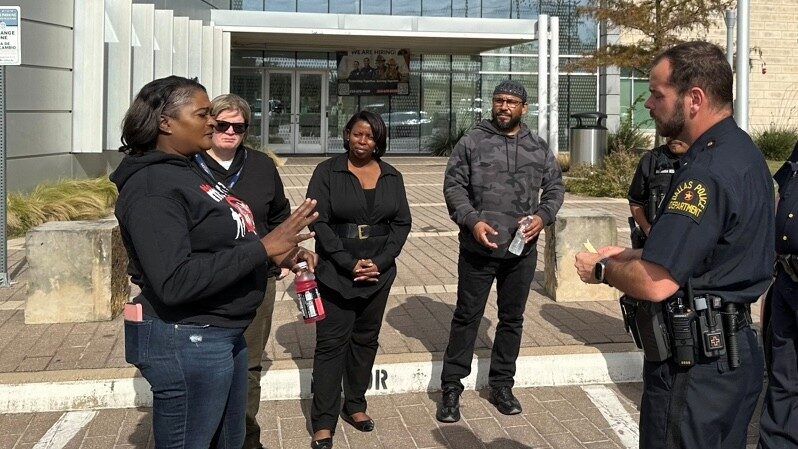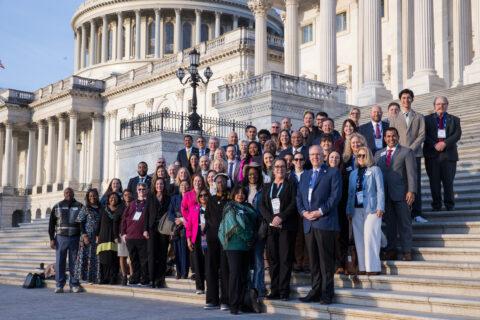Co-authored by Sandra Sadduk, Project Implementation Manager, Dallas Police Department’s Violent Crime Division
Partnerships are key to the success of citywide public safety strategies. The Dallas Police Department (DPD) is working to create safer communities using a strategy modeled on similar nationwide initiatives and evidence-based practices that uses both data and strategic partnerships to address violent crime. The focused deterrence strategy relies on an interagency group that crafts tailored plans for high-risk individuals to prevent future involvement in violence.
Launched in June 2023, the Focused Deterrence framework is reshaping the long-term approach of how DPD addresses violent crime, forging new ground in public safety through data-driven, collaborative and compassionate intervention. By centering this strategy within DPD’s Violent Crime Reduction Plan (VCRP), Dallas is demonstrating how law enforcement and community partners can work together to reduce victimization and create safer neighborhoods.
Dallas’ approach expands upon traditional law enforcement models by leveraging targeted outreach, robust case management and real-time data to identify and support individuals most at risk by offering both accountability and genuine opportunities for change. This innovative effort positions Dallas as a national leader in violence reduction.
A Data-Driven and Targeted Approach
The Focused Deterrence program is the long-term pillar of DPD’s VCRP. The project works with repeat chronic offenders (clients) statistically likely to re-offend, delivering a dual message: violence will not be accepted, and help is available for those willing to change.
Key elements of Dallas’ Focused Deterrence model include:
- Evidence-Based Identification: DPD uses unbiased, data-driven metrics to identify high-risk individuals, ranking them using set criteria such as prior offenses and gang membership. Offenders are placed into tiers, with Tier 1 representing greatest risk.
- Collaborative Engagement: The program is built on strong cooperation between DPD, the Dallas County District Attorney’s Office, federal agencies and a network of community partners. These agencies engage directly with clients through structured call-in sessions and neighborhood outreach, delivering clear messages about consequences and support options.
- Comprehensive Support and Accountability: Clients are offered job training, education and other social services, while also facing enhanced accountability for continued violence through vigorous prosecution of future offenses.
Implementation and Community Impact
Dallas’ Focused Deterrence program is more than a list of names; it’s a living and adaptive process. Every six months, DPD refreshes its roster of potential clients using the latest data. Call-in sessions bring together law enforcement leaders, prosecutors, community partners and even victims’ families to deliver a unified message. These sessions are not mandatory but offer immediate access to services and support.
To reach those unable or unwilling to attend call-ins, DPD launched the Focused Deterrence Neighborhood Outreach (FDNO) program in late 2024. This initiative brings the program’s message-and tangible resources directly to individuals’ homes or community spaces, ensuring no one is left behind.
Teams include uniformed officers, case workers and community voices of both pain and hope, often delivering food, information and support materials to participants and their families.
DPD addresses violence’s root causes through partnerships with community organizations and inclusion of “voices of pain”, those who have lost loved ones to gun violence, and “voices of hope,” individuals who have been significantly impacted by the criminal justice system but have turned their lives around.

Intensive Case Management
A cornerstone of Dallas’ approach is its investment in professional case management. DPD employs master’s level social workers experienced in crisis intervention and trauma, many that have been personally impacted by violence. These case managers provide:
- Holistic assessments and personalized life plans.
- Crisis intervention and wraparound support for both participants and families.
- Ongoing engagement to address the root causes of criminal behavior and prioritize stability.
Workshop Innovation
DPD’s workshops offer immediate, in-person services in safe, stigma-free environments like libraries or recreation centers. Prioritizing direct impact over referrals, these sessions connect participants with jobs, mental health care and other critical resources on the spot. This approach has resulted in dozens of successful service connections and life-changing interventions.
Measurable Progress and Replicable Success
Since the launch of the Violent Crime Reduction Plan in 2021, the city has seen a 19% reduction in violent crime, with targeted hot spots experiencing declines of over 34%. Focused Deterrence, as the long-term strategy, has contributed by addressing the small group of offenders responsible for a disproportionate number of violent offenses. Early results show promising reductions in recidivism among participants.
Critical Steps for Implementing Focused Deterrence:
- Align around shared outcomes: prioritize saving lives and rebuilding trust in communities most affected.
- Build diverse, empathetic teams: combine law enforcement, social work and lived experience for holistic solutions.
- Leverage data for action: use analytics to target interventions, measure impact and ensure transparency.
- Embed trust as a practice: make trust-building foundational in every aspect of violence reduction.
Conclusion
As a new model, Focused Deterrence can be challenging to embed into a police department. It requires strategic partnerships to transform public safety through non-traditional policing strategies. The Dallas Police Department leverages support of social services, community organizations and law enforcement to offer alternatives for those involved in violence. Through mutual respect and understanding, the City of Dallas is positioned to reshape public safety. The future depends on leadership’s willingness to innovate — let’s lead together.
“Having led Community Violence Intervention work from the Office of Integrated Public Safety Solutions (OIPSS) and now serving as the Project Implementation Manager within DPD, I’ve seen firsthand how transformative this partnership can be. The space created between law enforcement and community-based organizations is more than just symbolic—it’s practical and impactful. Since DPD invested in professional staff roles, we’ve shifted to a truly community-centered approach that strengthens our holistic response. My law enforcement colleagues and I learn from one another daily and adapt quickly to meet the dynamic nature of each client’s unique needs. The Dallas Police Department’s administration of a focused deterrence program has been a game-changer for the City of Dallas.”
– Sandra Sadduk, Project Implementation Manager, Dallas Police Department’s Violent Crime Division
Call to Action
As cities seek ways to transform public safety, invest in models built on strategic partnerships, trust, data and resource allocation to impacted communities. Invest heavily in building bridges that lead to safer and stronger cities.
Reshaping the Safety Narrative
NLC’s Municipal Action Guide: Adopting Community Metrics for Public Safety details how data can change the narrative around safety in your city, town or village.







